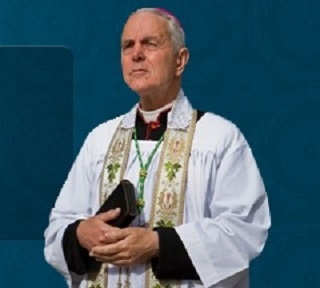Bishop Richard N. Williamson Archive: https://earthnewspaper.com/category/bishop-richard-n-williamson
September 10, 2022
Read Thomas Aquinas in the original Latin –
The greatest healer of minds one can imagine!
In one single Article of his common sense Summa Theologiae (I, 85, 2) St Thomas Aquinas refuted, some 500 years in advance, the nonsense of Kant and his numerous followers in modern times, according to which our human minds can know only the appearances of things around us. According to Kant, we human beings cannot know the reality of things as they really are behind their appearances. The thing as it is in itself, in German “das Ding an sich,” is absolutely unknowable by us. In that case, one may well ask, how do we even know that there exists any “Ding an sich” behind the appearances of things? Sure enough, Kant’s followers paid no more attention to any supposed reality in itself, or extra-mental reality, and modern “philosophy” was off into the Alice in Wonderland of the smile of the Cheshire Cat still in the tree after the cat has disappeared. Good bye, reality. Welcome, literally, any imaginable fantasy!
Aquinas has two common sense arguments to knock poor Kant out of the stadium. For instance, I see a horse in a meadow. Now the horse is obviously not inside my head, but only some representation of the horse. Now is that representation of the horse by which I know the horse, like a window on the horse itself so that the horse itself is what I know; or is that representation itself what I know, like a picture of the horse which portrays the horse but gives me no view of the horse itself? For Aquinas, representations in our mind are like windows on the reality outside our minds. For Kant they are like pictures behind or beyond which we can see nothing. For Aquinas they are whereby we know, for Kant they are what we know.
First argument of Aquinas: if we know only the smile of the cat and not the cat itself, so to speak, then how can we have any knowledge or science of cats or of any extra-mental reality? No more science or knowledge of reality outside our minds. But if we know nothing outside our minds but only our own representations, within them, then it is the end of any knowledge of reality, and the end of science. Sure enough. Many a contemporary “scientist” finishes by losing his grip on the reality of his own “science,” because, like almost all of today’s world, he has allowed Kantism to addle his wits.
Second argument: if we knew only the representations in our minds, then every representation would be true, because truth consists in the conformity between our minds and the reality outside them. But if we could know nothing beyond our own representations, we would have no access to any reality outside, to be able to tell whether or not our representations conformed to it. So all judgments of our minds based on our own representations would become true, because they would be in conformity with themselves. So Paul could judge that honey is bitter while Peter could judge that it is sweet, and both of them would be right! Neither of them would have access to any objective reality beyond each one’s own representations of it by which to settle the clash of their contradictory opinions. Here dies the law of non-contradiction, here dies the possibility of discussion, here dies all objective thought, here is born modern “philosophy.”
And, supreme objectivity, Aquinas goes on in the same Article to explain that in real life the very form of the object outside our minds, that gives to that object its existence, is what also in-forms our minds, giving to our minds the very existence of its thoughts. In other words, not only are our minds capable of grasping extra-mental reality, but also they are incapable of functioning at all without it (at least at the origin of their thinking). Therefore the very basis of human thinking must be objective, that basis (as far as it is knowable) can be resorted to to settle any clash of subjective opinions, and the law in objective reality of non-contradiction – nothing can be and not be in the same respect at the same time – is also the basis of our thinking. Thus our representations of reality are emphatically windows that faithfully present reality outside our minds, and not pictures that block our view of any reality beyond or behind them, as the abominable Kant pretends, to the ruination of any grasp on reality, and of any objective thinking.
Kyrie eleison
This issue deals with common sense, Kant, reality, science, and St. Thomas Aquinas. Find issues dealing with these topics by clicking on the topic word.
Source: https://stmarcelinitiative.com/aquinas-reality
Bishop Richard N. Williamson
https://StMarcelInitiative.com
Subscribe To The EarthNewspaper.com Newsletter
https://EarthNewspaper.com/Subscribe
Support Honest, Independent, And Ad-Free News
https://EarthNewspaper.com/Donate

